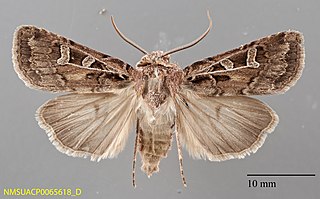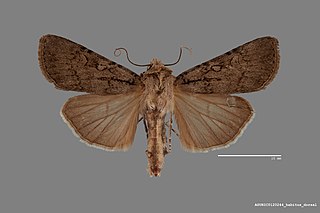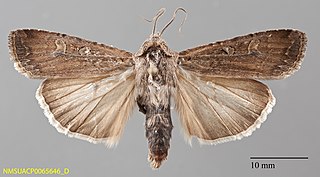
Euxoa is a genus of moths of the family Noctuidae raised to Genus by the German entomologist, Jacob Hübner. The Genus is mostly confined to dry and semi dry areas in the Northern Hemisphere. There 130 species in Eurasia, a few in Africa, and 175 in North America. There are no species in the Genus in South-East Asia or in Australia. In North America, most species are found in Western regions. Of the North American species, 4 are endemic to Mexico. There is one species recorded from Chile, but this may be a mislabeled specimen. In real terms, species numbers do not equal species abundance. Some areas with few species have large numbers of the ones that do live there.

Euxoa messoria, the darksided cutworm or reaper dart, is a moth of the family Noctuidae. The species was first described by Thaddeus William Harris in 1841. It is found from Newfoundland west to Yukon, south to Virginia and Missouri in the east and New Mexico, Arizona and California in the west.

Euxoa tronellus is a moth of the family Noctuidae first described by Smith in 1903. It is found in western North America.

Euxoa nomas is a species of moth of the family Noctuidae described by Nikolay Grigoryevich Erschoff in 1874. It is found in Iran and Turkestan, as well as Alaska and Canada.

Euxoa catenula is a species of moth of the family Noctuidae first described by Augustus Radcliffe Grote in 1879. It is found in North America from southern Saskatchewan west to southern Vancouver Island, south to Kansas, New Mexico, Arizona and southern California.
Euxoa campestris, the flat dart, is a moth of the family Noctuidae. The species was first described by Augustus Radcliffe Grote in 1875. It is found in North America from Newfoundland to Alaska, south to New England and southern Canada from southern Quebec west to British Columbia. In the west it is distributed southward in the Rocky Mountains to southern New Mexico, east-central Arizona, and central Utah. In the east it occurs in the Appalachians in eastern Kentucky and in western North Carolina.

Euxoa adumbrata, the sordid dart, is a moth of the family Noctuidae. The species was first described by Eduard Friedrich Eversmann in 1842. In North America it is found across northern Canada from Quebec to western Alaska, south to the northern parts of the United States, and in the mountains to Colorado. It is also found in Greenland, the coastal areas of Scandinavia and the Ural. It was recently recorded from Denmark, although this includes Euxoa lidia, which some authors regard to be a valid species.
Euxoa bochus is a moth of the family Noctuidae first described by Herbert Knowles Morrison in 1874. It is found in western North America, from Vancouver Island, south to southern Utah and northern New Mexico, east to central Colorado, Wyoming and the Cypress Hills area of south-western Saskatchewan. It is also present in Manitoba and British Columbia.
Euxoa declarata, the clear dart, is a moth of the family Noctuidae. The species was first described by Francis Walker in 1865. It is found in Canada in Ontario, Quebec, New Brunswick, Nova Scotia, Prince Edward Island, British Columbia, Alberta, Saskatchewan, Yukon and Manitoba. It is found as far west as central Alaska. In the United States it is also found to Minnesota and North Carolina in the east and Arizona, New Mexico and California in the west.

Euxoa divergens, the divergent dart, is a moth of the family Noctuidae. The species was first described by Francis Walker in 1857. It is found in North America from Newfoundland to Alaska, south to New York and Michigan in the east, and in the mountains of the west, south to New Mexico, Arizona and California.

Euxoa aequalis is a species of moth in the family Noctuidae first described by Leon F. Harvey in 1876. It is found in Canada from British Columbia, Alberta, Saskatchewan and Yukon, south into the United States, where it has been recorded from Colorado, Wyoming and California.
Euxoa atomaris is a moth of the family Noctuidae first described by Smith in 1890. It is found in North America from North Dakota, southern Alberta and British Columbia, south to central New Mexico, Arizona and southern California.
Euxoa auripennis is a moth of the family Noctuidae first described by J. Donald Lafontaine in 1974. It is found in western North America from eastern North Dakota and south-western Manitoba west to central British Columbia, south to southern California and Colorado.
Euxoa aurulenta, the dune cutworm, is a moth of the family Noctuidae. The species was first described by Smith in 1888. It is found in North America from Ontario west to Alberta and Washington, south to Illinois, Nebraska, Colorado and Arizona.

Euxoa choris is a moth of the family Noctuidae first described by Leon F. Harvey in 1876. It is found in North America from south-western Saskatchewan, central Alberta and south-central Yukon, south to New Mexico, Arizona and California.

Euxoa cicatricosa is a species of moth in the family Noctuidae that was first described by Augustus Radcliffe Grote and Coleman Townsend Robinson in 1865. It is found in North America from south-central Saskatchewan west to the southern interior of British Columbia; south to southern California, Arizona, New Mexico and western Texas; east to western Nebraska and North Dakota.

Euxoa clausa is a moth of the family Noctuidae first described by James Halliday McDunnough in 1923. It is known in North America mainly from the north-western Great Plains in southern Saskatchewan and Alberta, south to south-western Montana and Nebraska.
Euxoa dargo is a moth of the family Noctuidae first described by Ferdinand Heinrich Hermann Strecker in 1898. It is found in North America from south-eastern Manitoba west to the southern interior of British Columbia, south to Oregon, southern Idaho and northern New Mexico, and east to eastern South Dakota.

Euxoa edictalis is a species of moth in the family Noctuidae first described by Smith in 1893. It is found in North America from south central Alberta and east-central Montana, west to south-central British Columbia, south to central California, southern Nevada, central Utah and western Colorado.

Euxoa inconcinna is a species of cutworm or dart moth in the family Noctuidae. It is found in North America.











